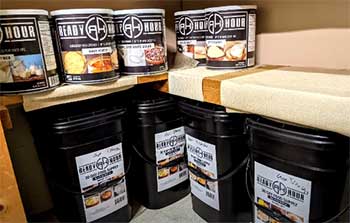If you’re like me and live in an area where power outages are common, or you simply need a reliable power source for off-grid adventures, then you know the importance of having a dependable generator.
When I found myself searching for a robust backup power option, the PREDATOR 9500 inverter generator stood out, and I’ll walk you through my personal experience and thoughts on this machine.
Now, let me start by saying, if you’re looking to buy the Predator 9500, your best bet is to head to Harbor Freight.
Not only do they usually have it in stock, but they also offer financing options, which came in handy for me. Now that we’ve got that covered, let’s dive into what makes this generator special, and why it might be the perfect fit for you.
Why I Chose PREDATOR 9500 Inverter Generator?
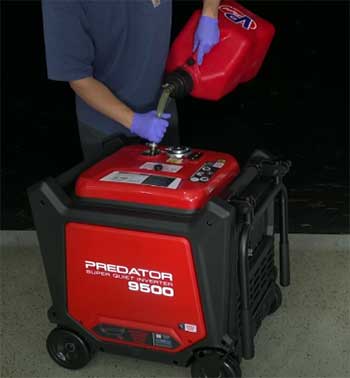
I had never planned on getting something as powerful as the Predator 9500, but when a massive ice storm hit my area, I had no choice.
My smaller generator just wasn’t cutting it anymore.
I had heard great things about the Predator brand, especially in terms of power-to-cost ratio, and when I found one at my local store, I decided to give it a try.
It was more than I initially intended to spend, but after just a few days with this powerhouse, I knew it was worth every penny.
It’s not just about its ability to power essential items; it’s also about its quiet operation, fuel efficiency, and ease of use.
Pros of The Predator 9500 Inverter Generator
- Massive Power Output The first thing you’ll notice with the Predator 9500 is its massive 9500-watt starting power and 7600-watt running power. This isn’t your typical portable generator; this is a machine designed to keep your entire home, cabin, or RV powered up. I was able to run my water well, septic system, AC units, fridge, lights, and TV with no issues. For those who worry about sensitive electronics, the pure sine wave inverter technology ensures clean and stable power, making it safe to use with devices like laptops, TVs, and even gaming consoles.
- Super Quiet Operation: This generator operates at 67 dB, which is comparable to a normal conversation. I’ve had neighbors with smaller, louder generators that sound like a truck idling in their yard. The quietness of the Predator 9500 truly impressed me, and I wasn’t the only one. The last thing you want during a power outage is to have a machine roaring away all night
- Fuel Efficiency: The 6.8-gallon fuel tank gives you up to 18.5 hours of runtime at 25% load, which is a lifesaver during long outages. After running it for several hours, I only needed to refuel once a day. For the amount of power it delivers, the fuel efficiency is exceptional.
- Portability: Despite its size, the flat-free wheels and foldable handle make it surprisingly easy to move around. Yes, it’s heavy, but once it’s on the wheels, maneuvering it becomes manageable. Plus, the fact that it comes equipped with wheels means you’re not stuck trying to haul it from one place to another.
- Electric Start: One of my favorite features is the electric start. There’s nothing worse than yanking a pull cord over and over, especially when you need power in a hurry. With this, you just press a button, and it’s up and running. The battery for the electric start is also non-spillable, adding an extra layer of safety.
Cons of The Predator 9500 Inverter Generator
While this generator has a lot going for it, it’s not without its downsides. Here are a few things to consider before making the purchase:
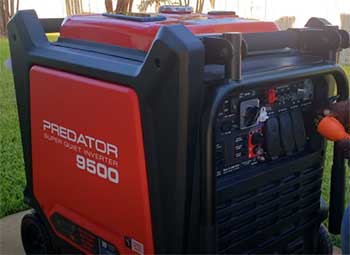
- Weight: The Predator 9500 is heavy, weighing in at 257 pounds. Even with the wheels, you’re not going to be throwing this thing in the back of your truck without help. For me, it’s worth the weight given the power it provides, but it’s something to keep in mind.
- Price: At around $2,000, the Predator 9500 is an investment. While it’s cheaper than some high-end models from Honda or Yamaha, it’s still a significant purchase. If you don’t need this much power, you might want to consider a smaller, less expensive option.
- Size: This generator isn’t small, and if you’re tight on storage space, it may not be the most convenient option. I found a spot for it in my garage, but it’s definitely something to consider if space is an issue for you.
- No Oil Included: One of the small annoyances I had was that the generator didn’t come with oil. So make sure you grab some 10W-30 oil when you buy it, as you’ll need it for the initial setup.
Maintenance Tips For The Predator 9500
To keep your Predator 9500 running smoothly, regular maintenance is essential. Here’s what I’ve learned about maintaining this beast of a generator:
- Oil Changes: The integrated hour meter makes it easy to track when it’s time for maintenance. I usually do an oil change after every 100 hours of use. This is a simple but essential task to ensure the longevity of your generator.
- Fuel Stabilizer: If you’re not going to use the generator regularly, add a fuel stabilizer to prevent the gas from going bad. This helps avoid gunk buildup in the carburetor, which could cause issues when you need the generator in an emergency.
- Battery Maintenance: If you’re storing the generator for an extended period, disconnect the battery to prevent drainage. I found that keeping the battery charged prolongs its life and ensures that the electric start works every time.
- Air Filter Cleaning: Make sure to clean the air filter after heavy use or if you’ve been using the generator in a dusty environment. This helps maintain fuel efficiency and prevents the engine from clogging up.
Comparison With Other Brands
When comparing the Predator 9500 to other brands, especially in terms of power and price, it holds its own remarkably well. Here’s a look at how it stacks up:
- Predator 9500 Vs. Predator 4550 Inverter Generator
Sticking within the Predator family, the 9500 and 4550 are both great machines, but they serve different needs.
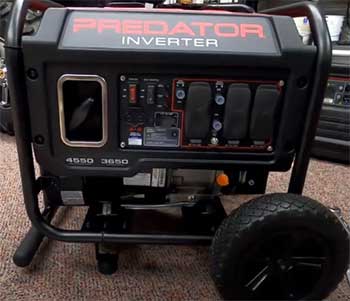
The Predator 4550 is a more compact model, offering 4550 starting watts and 3650 running watts, which is quite a bit lower than the 9500’s 9500 starting watts and 7600 running watts.
If you only need backup for a few essential appliances or you’re camping, the 4550 might be sufficient.
However, for whole-house backup or larger loads, the 9500 is the clear winner.
The 4550 is also quieter at 57 dB compared to the 9500’s 67 dB, but both are relatively quiet for generators of their power class.
Portability is easier with the 4550 due to its smaller size and lighter weight, but the 9500’s flat-free wheels help mitigate its bulkier frame.
The 9500 also features CO SECURE® technology, something you won’t find on the smaller 4550. This safety feature shuts down the generator automatically if dangerous levels of carbon monoxide are detected, making it a safer option for extended use.
- Predator 9500 Vs. GENMAX GM3200i Generator
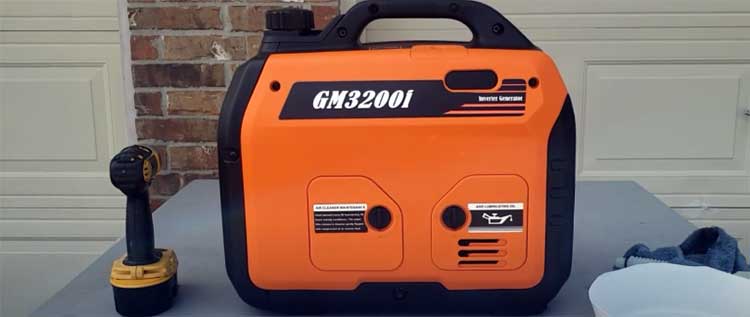
The GENMAX GM3200i is another competitor in the inverter generator category, but it’s a much smaller unit compared to the Predator 9500.
With just 3200 starting watts and 2800 running watts, the GENMAX GM3200i is designed for portability and lighter loads. It’s perfect for camping trips, RV use, or powering a couple of appliances during a brief outage.
That being said, the GM3200i simply doesn’t have the muscle to power an entire home during a blackout, something the Predator 9500 does with ease. In terms of noise, the GENMAX is even quieter than the Predator 9500, operating around 58 dB. While that’s impressive, it comes at the expense of power and functionality.
The GENMAX is also much lighter and easier to carry, but you’ll find it lacking in fuel efficiency and runtime compared to the Predator 9500, which can run up to 18.5 hours on a single tank.
If you need a small, ultra-portable generator for light tasks, the GENMAX GM3200i is a solid choice, but if you need reliable, full-house power, the Predator 9500 is in a different league altogether.
- Predator 9500 Vs. Powermate 7500 Generator
Now, comparing the Predator 9500 with the Powermate 7500 offers a closer match in terms of power output. The Powermate 7500 comes with 7500 running watts and 9375 starting watts, which is somewhat comparable to the Predator 9500. However, the Predator 9500 takes the lead in a few key areas.
First, the Predator 9500 runs much quieter, around 67 dB, whereas the Powermate 7500 is noisier. If you’re concerned about the sound level during long power outages or while using it at home, the Predator’s quieter operation makes a noticeable difference.
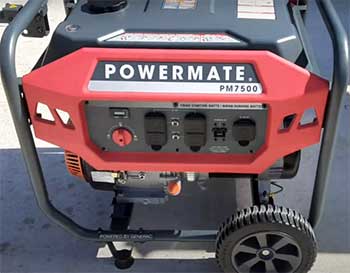
The Powermate 7500 also lacks some of the advanced features found on the Predator 9500, such as the ESC Mode for optimizing fuel efficiency and the CO SECURE® technology for added safety.
Both generators are on the heavier side, but the Predator 9500’s design, including its four flat-free wheels and foldable handle, make it a bit easier to maneuver despite its size.
Runtime is another area where the Predator 9500 shines, giving you up to 18.5 hours of power at 25% load, whereas the Powermate 7500 tends to have shorter runtime on the same amount of fuel.
For those needing a solid home backup generator, the Powermate 7500 is a good option, but the Predator 9500 edges ahead with its superior features, quieter operation, and better runtime.
Also Read: Is Pulsar 4000 Watt Inverter Generator Worth It?
Frequently Asked Questions (FAQ)
With regular maintenance, the Predator 9500 can last over a decade. Its durable 459cc engine and quality build ensure long-term reliability.
Yes, the 9500-watt generator can power essential appliances and devices, making it capable of running most of a home’s electrical needs during an outage.
It operates at about 67 dB, which is comparable to a normal conversation and significantly quieter than many conventional generators.
Inverter generators tend to be more expensive and heavier than conventional models. While they are quieter and more efficient, they might not meet extremely high power demands for industrial use.
Conclusion: Is the Predator 9500 Inverter Generator Worth It?
In my experience, the Predator 9500 has been a game-changer. Whether you’re facing a multi-day power outage, powering your RV for a weekend getaway, or just need a reliable backup for your sensitive electronics, this generator delivers.
While it’s not the cheapest option on the market, the combination of power, fuel efficiency, and quiet operation makes it a standout.
For those looking to purchase the Predator 9500, I’d recommend heading to Harbor Freight—they often have deals and financing options available, making it easier to manage the cost.

